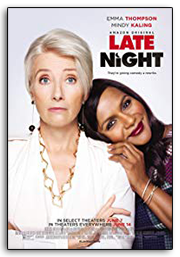

Charlyne Gelt, Ph.D.
Connections! Chapter News
Nikki Gabriel
President's Message
Read
Ariel Cohen
CAMFT Facebook Page
Legislative Updates
Read
Quentin Dunne
July Membership
Meeting Write-Up
Read
June Board Minutes
Read
July Board Minutes
Read
2020 Board Slate
Read
CAMFT's
Inaugural Pre-License
Conference and Job Fair
Read
Member Columnists
Charlyne Gelt
Cinema Therapy
Late Night
Read
Contributors
Susan Cristol
Book Review
Anti-Depressants
Read
Member Highlight
Shawn LaRe Brinkley
Read
Ariel Cohen
Read
Sponsors
SimplePractice
Read
Destinations for Teens
Read
Unruh Mediation
Read
Discovery Mood &
Anxiety Programs
Read
The Therapist
Development Center
Read
Harmony Place
Read
Gregg Bruno Homes
Read
eBlasts
August 2019 eBlasts
Read
September 2019 eBlasts
Read
Contact Us
Read
Cinema Therapy — Charlyne Gelt, Ph.D.
Late Night
"It's the heart afraid of breaking that never learns to dance." Amanda McBroom
Psychologists search for what makes people change. Oftentimes, as in the film LATE NIGHT, ordinary human interaction does the trick. However, interaction with others as a prescription for healing is easier said than done, especially when one is unaware of one’s own “shadow,” meaning unconscious that a problem even exists! People block out and shut down aspects of themselves for reasons locked in the murky waters of the unconscious.
 LATE NIGHT stars Emma Thompson as talk show host KATHERINE NEWBURY, the sole female to have dominated the late-night comedy circuit for over thirty years. Workplace crisis and circumstances place Katherine together with a young “diversity hire,” Molly Patel, played by Mindy Kaling (who also wrote and produced the film), and in the background is Katherine’s detached, and very private life with her husband, Walter (John Lithgow). Though suffering from a debilitating disease, he is her nurturing supporter, her advocate, and her critic.
LATE NIGHT stars Emma Thompson as talk show host KATHERINE NEWBURY, the sole female to have dominated the late-night comedy circuit for over thirty years. Workplace crisis and circumstances place Katherine together with a young “diversity hire,” Molly Patel, played by Mindy Kaling (who also wrote and produced the film), and in the background is Katherine’s detached, and very private life with her husband, Walter (John Lithgow). Though suffering from a debilitating disease, he is her nurturing supporter, her advocate, and her critic.
Katherine presents as a rigid, harsh, iron-fisted, cold, arrogant character, elitist, out of touch and unbending. But as a talk show host, she has developed a long-term kinship with her audience, a community of fans who resonate with her style, love her sharp comedy, and acting skills. Katherine’s success with her biting humor have become a shield for her deep, inner sense of inadequacy, as does her need to surround herself with mirroring “self-objects,” meaning employees like herself who idealize her, mimic her perspective, and her opinions, and men who admire and validate rather than confront her. Unable to tolerate differentness, she fires employees who defy her authority. Unaware of her own self-absorbed style, she even accuses a younger generation of writers of being narcissistic.
LATE NIGHT opens with a crisis brewing: Though Katherine’s office is lined with Emmy Awards, her ratings have taken a nosedive. The very talent, the caustic humor that always protected her from herself is no longer working and now keeps her in the hinterlands of her previously welcoming audience. She is out of touch with the changes in the world around her.
Clarity that that her legendary show is on the chopping block, forces Katherine to reluctantly take action, including taking a good, hard look at those parts of herself she would rather deny, which Carl Jung calls “the shadow.” Katherine ― known for not liking women ― orders her right-hand man BRAD (Denis O’Hare) to hire a woman, Molly, who just happens to be interviewing with Brad on that same day, and although Molly has no experience, because she's a woman, and because she's a woman of color, she gets hired. The question is: how will this naive, starry-eyed outsider stay in the room?
Molly is given a hard time when she enters the writer’s room for the first time. The idea was for her to smooth over the diversity concerns of Katherine’s writing staff, but it’s clear that nobody wants her there. There isn't even a chair for her, so she overturns a trash can and sits on it! When she brings her Quality-Control experience to bear, suggesting ways to improve the “Late Night” show, both she and her ideas are resented.
Molly’s character is honest and genuine, so her fresh perspective begins to earn her respect in the writer’s room and chip away at Katherine’s protective shell. She turns Katherine’s public and private worlds upside down, encouraging Katherine to stop hiding behind a facade of rigidity and emotional isolation. Her strength is in her shadow: openness and sincerity.
LATE NIGHT is billed as a comedy, but subtle tongue-in-cheek satirical commentary woven into the dialogue speaks to challenges in real-life situations encountered by women in all walks of life ― issues of class, gender, age, sexual intonations, the #Me-Too movement, assumptions about men, women, power, and the emotional toxicity of being the only female staff writer in a room of all white males.
Molly continues to be the catalyst for unexpectedly positive consequences as the two women, separated by culture and generations, become united by a common goal, the subtleties of comedy itself. Their relationship evolves as the two women struggle to find a handhold in a culture that doesn't want them to succeed.
As Katherine begins to open up to her audience about her own struggle with depression, apologizes to her coworkers, connects with peers on an emotional level, repairs her marriage, and hires a more diverse staff, what we witness is a coming together of Katherine’s disowned, split-off aspects of the self. This is the goal of the journey of individuation (Jung), wholeness, consciousness, a coming to terms with those split-off, repressed, pushed-down, shadowy aspects of the self.
Now let’s take a look at the dynamics and interactions of LATE NIGHT’s characters from a psychological perspective.
Psychological Implications:
LATE NIGHT is a good example of how understanding a little about the psychological concepts and characters’ dynamics can make film viewing so much more interesting, in this case, the concepts “shadow” and “self-object.”
Shadow:
Briefly, “shadow” is a word coined by CG Jung to sum up what each of us fears and despises and cannot accept in themselves. This is not to say that their low evaluation of self is correct; it could be something handed down to them from their family of origin ― core beliefs about certain qualities, for example. So, anything we perceive (correctly or not) as “not right” within us may be “shadow” content.
It has been said that if "you spot it, you got it." Most of us are blind to our own psychological shadow, which we often project onto others ― our partners, our parents, even strangers. Interestingly, we project our positive, as well as our negative traits, for example, affluence, achievement and success (“money is the root of evil”) may be seen as not okay in the family of origin, so we carry it into our adult life. To others shadow is “as plain as the nose on your face" but hard to “own” qualities. It’s difficult to look in the mirror and see what lies dormant until a crisis knocks us down a peg. Look at the character defects in others that frustrate you the most. “Am I seeing myself in them?” Katherine clearly saw these defects in others but could not look in the mirror until LATE NIGHT was on the chopping block.
Narcissistic wounding and Self-Object:
As a poetic metaphor, “All the king’s horses and all the king’s men could not put Humpty Dumpty together again.” Like Humpty-Dumpty, Katherine feared falling apart! To keep herself glued together, she needed mirroring, validation, and approval so she surrounded herself with an adoring audience and yes-men in order to maintain a cohesive sense of self. We all need affirmation of our value, to be the gleam in somebody’s eye. In Kohut’s self-psychology (Kohut 1971;1977;1984) these are understood as self-object needs. If such normal childhood dependency needs are not met from the parental environment, the developing child experiences a narcissistic wound. Thus, the drive for a self-object, meaning anyone who keeps us feeling glued together and enhances our sense of well-being. Katherine’s “fan base” met herself object needs including her need for Twinship, kinship. This is an internal need for sameness with others, being understood by someone like me, such as a community of people of shared beliefs. Katherine also needed to feel Idealized psychologically, carry importance, feel respected, admired, wise, and strong. These brought her a source of soothing when anxious or stressed. As a successful stand-up comedian these needs got met.
Katherine’s husband, Walter, became her Adversarial self-object ― both supportive and confirming, and an opposing force who allowed opposition. Both Katherine and Molly met the need for efficacy ― they had an effect on each other, empowering both: “If I can elicit a response, I must be somebody.”
These self-object needs are continuously unfolding as the process of individuation evolves. People can experience healing and change as the result of their positive influences and interactions on each other. Opportunity for change is always knocking. Whether life crisis, such as illness, relationship issues, employment on the chopping block, or Katherine being forced to deal with her shadow issues (Molly), such may be seen as therapeutic opportunities, transformative experiences, and they pop up all around us every day.
Charlyne Gelt, Ph.D. (PSY22909) is a clinical psychologist who practices in Encino. She leads Women's Empowerment Groups that help women learn the tools to move beyond self-destructive relationship patterns. She may be reached at 818.501.4123 or cgelt@earthlink.net. Her office address is 16055 Ventura Blvd. #1129 Encino, CA 91436.